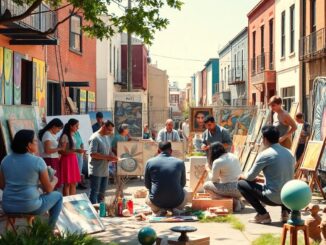How do we balance the allure of big-name concerts with the needs of local communities and green spaces?

Topics covered
The debate surrounding large-scale music events in Cardiff, particularly at Blackweir Fields, raises an uncomfortable question: at what cost do we pursue commercial interests in public spaces? As someone who’s been in the tech startup world—first as a Google Product Manager and now as a founder—I’ve seen how the allure of quick revenue can overshadow the needs of the community.
Recently, a public meeting in Cardiff brought this dilemma to the forefront, with residents expressing their worries about events featuring artists like Noah Kahan and Alanis Morissette impacting Bute Park. Are we prioritizing profit over people?
Understanding the Financial Implications
Cardiff Council argues that hosting these large gigs would generate significant financial benefits, helping fund local music venues and maintain city parks. But let’s take a closer look. This perspective often glosses over the underlying data that tells a different story.
Public parks are meant to be accessible spaces for everyone. However, events like Blackweir Live can draw crowds of up to 35,000. Sure, the immediate financial benefits sound great, but what about the long-term community needs?
During the meeting, local residents raised valid concerns about losing access to green spaces and the potential impact on grassroots sports. The council’s focus on economic benefits raises another question: what about the social implications? If residents feel that their needs are sidelined in favor of commercial interests, the churn rate of local engagement with parks could increase. This risk is especially relevant in a city that prides itself on community involvement and connection to its green spaces. Are we willing to sacrifice our community identity for a quick financial boost?
Case Studies of Success and Failure
I’ve seen too many startups fail because they lost sight of their core mission in pursuit of short-term gains. This situation is no different. Cardiff’s ambitions for tourism and music culture must be balanced with the essential need to maintain local identity and community welfare. Take Austin, Texas, for example. They’ve successfully hosted large music festivals while prioritizing local engagement through community feedback mechanisms, ensuring public spaces remain accessible. On the flip side, other cities have faced backlash and eroded public trust after similar events, leading to a long-term decline in community involvement. What can we learn from these examples?
As the council considers its approach, it’s crucial to analyze the implications of policies that prioritize commercial interests over community needs. While the approval of a license with 46 conditions for Blackweir Fields is a step in the right direction, it raises further questions about the long-term sustainability of such events. Will these conditions genuinely mitigate adverse effects, or are they merely a band-aid solution to a larger issue? How do we strike the right balance?
Practical Lessons for Founders and Public Decision-Makers
As a founder, I’ve learned that understanding your audience is key. Local residents have made it clear that they want a balanced approach to events. This feedback should not only be acknowledged but actively integrated into planning decisions. The big takeaway here? It’s all about product-market fit—not just in tech, but in community engagement, too. Events should cater to the local demographic and enhance their quality of life rather than detract from it. Can we do better?
Moreover, the conversation should extend to exploring alternative venues that could accommodate larger audiences without sacrificing access to essential green spaces. The Principality Stadium, for instance, could serve as a viable option for such events. By fostering collaboration between local businesses, event organizers, and community stakeholders, Cardiff could create a model where both commercial interests and public needs thrive. Isn’t that the ideal scenario?
Actionable Takeaways
1. Engage with the community: Regularly solicit feedback from residents to ensure their needs are prioritized in decision-making processes.
2. Assess long-term impacts: Evaluate the potential social and environmental effects of large events, beyond immediate financial gains.
3. Explore alternative venues: Consider hosting significant events in locations that minimize disruption to community spaces.
4. Balance commercial and community interests: Develop policies that foster a symbiotic relationship between economic development and community welfare.
5. Monitor audience engagement: Track local involvement and sentiment following events to inform future planning and maintain public trust.
The ongoing discussions in Cardiff serve as a crucial reminder that while pursuing economic opportunities is essential, we must not do so at the expense of our community values and environmental stewardship. By prioritizing a balanced approach, we can ensure that public spaces remain vibrant and accessible for generations to come. Are we ready to take that step forward?




